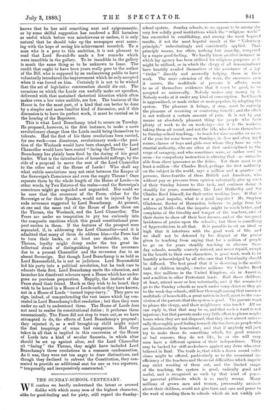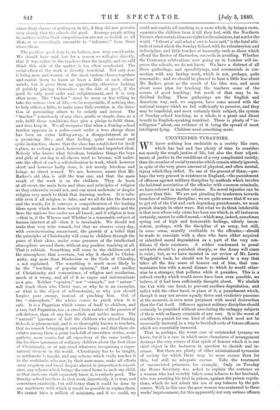THE SUNDAY-SCHOOL CENTENARY.
WE confess we lardly understand the latent or avowed dislike with which many men of the highest character, alike for good-feeling and for piety, still regard the Sunday- school system. Sunday schools, to us, appear to be among the very few solidly good institutions which the " religious world" has succeeded in establishing, and among the most hopeful results, if not the most hopeful result of the " Voluntary principle," unhesitatingly and consistently applied. That principle means, too often, nothing but anarchy, tempered by a vague good-feeling. We hardly know another instance in which lay agency has been utilised for religious purposes as it might be utilised, or in which the clergy of all denominations have heartily availed themselves of the assistance of a lay " Order" directly and avowedly helping them in their work. The mere extension of the work, the enormous area. it covers, the multitude of persons it affiTts, seem to us of themselves evidences that it must be good, to be accepted so universally. Nobody makes any money by it. Nobody works at it under any kind of conscription. No Church is aggrandised, or made richer or more popular, by adopting the system. The pleasure it brings, if any, must be entirely the pleasure of receiving or conferring benefit ; and the effort is not without a certain amount of pain. It is not by any means an absolutely pleasant thing for people who have plenty of work to do on week-days—for it is the workers, taking them all round, and not the idle, who devote themselves to Sunday-school teaching,—to teach for nine months, or mere, of the year for sonic hours on Sundays, in close and often fetid - rooms, classes of boys and girls over whom they have no sub- stantial authority, who are often at first undisciplined to the verge of savagery, and who sometimes seem, or rather used to seem—for compulsory instruction is altering that— as unteach- able from sheer ignorance as the fishes. Yet there must be at least a million—Sir Charles Reed, perhaps the first authority on the subject in the world, says a million and a quarter—of persons, three-fourths of them British aud American, .who• without pay or pressure from opinion voluntarily give upmost of their Sunday leisure to this task, and continue doing it steadily for years, sometimes, like Lord Hatherley and Sir Charles Reed himself, for their entire working lives. If that is not a good impulse, what is a good impulse ? Mr. Stephen. Gladstone, Rector of Hawarden, believes—to judge from his address at Mold—that the impulse might be much better, and complains of the frivolity and temper of the teachers, and of their desire to show off their best dresses, and of the too great lavishness of praise upon the schools ; but there is something of hypercriticism in all that, it is possible to set an ideal so high that it interferes with the good work of life, and. we shall not be deterred by his disgust at the prai,e given to teaching from saying that for a million of people to go on for years steadily teaching in obscure Son-- day schools, usually scarcely noticed, and never repaid, except in the benefit to their own characters, is good work, work to be heartily acknowledged by all who care that Christianity shoull be diffused. The best proof that it is deserving is the multi- tude of children taught,—twelve millions Sir Charles Reed says, five millions in the United Kingdom, six in America, and a million in other Protestant lands. Half those children, at least, attend more or less voluntarily, and if the remainder go to the Sunday schools as much under compulsion as they go, to the week-day schools, still how thorough among that immense multitude of households, a great nation in itself, must be the Con- viction of the parents that the system is good. The parents want to please the clergy, and their neighbours who teach? All we can reply is, that that may be so, and that such a want is not injurious; but that parents make very little effort to please neigh- bours when they are not disposed, that they show almost univer- sally thoroughly good feeling towards the teachers, as people wh& are disinterestedly benevolent; and that if anybody will just try to make them do something which, for good reasons or bad reasons, they do not like, he or she will very soon have a different opinion of their independence. They may be backed for stiff-neckedness against any Jews who ever believed in Baal. The truth is, that while a dozen sound criti- cisms might be offered, particularly as to the occasional in- efficiency of the teachers and the social difficulties which impede any strict weeding of them out, and the limited range of the teaching, the system is good, radically good ani useful, and is recognised as such by that kind of popu- lar parental plebiscite which is so rarely wrong. Many millions of grown men and women, presumably anxious about their children, would not give time and care and pence to the work of sending them to schools which do not visibly ad-
vance their chance of getting on in life, if they did not perceive very clearly that the schools did good. Average people acting in matters within their comprehension are not so foolish as all that, or so exceedingly amenable to " influence " from those above them.
The positive good done is, we believe, now very considerable. We should have said, but for a reason we will give directly, that it was rather to the teachers than the taught, and we still think this side of the matter is too often overlooked. The social effect of the work is directly beneficial. Not only does it bring men and women of the most various classes together, and enable them to know at least a little of each others' minds, but it gives them an opportunity, otherwise lacking, of publicly placing themselves on the side of good, if the good be only good order and enlightenment, and it is very often more. The " teacher " must be more or less willing to take the serious view of life,—to be respectable, if nothing else, to help others a little, to make some little exertion in the direc- tion of persuading others to be orderly and decent. The "teacher " notoriously of any class, gentle or simple, does, as a rule, fulfil those conditions, does give a pledge to fulfil them, and does keep it. We all recognise that when a Sunday-school teacher appears in a police-court under a true charge there has been an extra falling-away, a disappointment as to a promising life ; and that feeling, quite universal and quite instinctive, shows that the class has established for itself a place, as seeking a good, however humble and imperfect ideal. Nobody who knows what frivolous, brainless things the boys and girls of our day in all classes tend to become, will under- rate the effect of such a self-dedication to work, which however short and however badly done, is not merely frivolous and brings no direct reward. We are, however, aware that Mr. Raikes's old idea is still the true one, and that the main result of the work is on the children. They do learn at all events the main facts and ideas and principles of religion as they otherwise would not, and one must underrate or despise religion very much to think that learning useless. It is valu- able even if all religion is false, and we all die like the flowers and the weeds, for it conveys a comprehension of the leading ideas upon which modern society and modern politics and the laws the nations live under are all based ; and if religion is true —that is, if the Whence and Whither is a reasonable subject of human interest at all—then it is invaluable. We should not make that very trite remark, but that we observe every day, with ever-increasing amazement, the growth of a belief that the principles of Christianity will come to children through the pores of their skins, under some pressure of the intellectual atmosphere around them, without any positive teaching at all. That is rubbish. Something will come to the children out of the atmosphere, that is certain, but why it should be Christ- anity, any more than Hindooism or the Code of Chivalry,
not explained. The something is much more likely to be the "teaching of popular opinion," that odd medley of Christianity and convenience, of religion and secularism, much of it wrong, and all of it as vague and indeterminate as a gas. Neither " opinion," nor "example," nor " nature " will teach them who Christ was, or why he is an exemplar, or what is the object of self-restraint, or why you should forgive your enemy, instead of pinching him. Out of the "atmosphere," the advice comes to pinch when it is safe. It is a Paganism which comes of itself to children, and a very bad Paganism, too ; a creed born rather of the passion of self-defence, than of any less selfish and nobler motive. The "natural" ignorance of half the children who attend Sunday Schools is phenomenal, and is so thoroughly known to teachers, that no remark betraying it surprises them ; and that there cir- culates among them a great book-full of unwritten stories, some pathetic, more comic, but all expository of the same truth,— the limitless ignorance of ordinary children about the first ideas of Christianity, or of any creed whatever, recognising a super- natural element in the world. Christianity has to be taught, as arithmetic is taught, and any scheme which really teaches it to the multitude, who now, by their mere mass, make all efforts seem nugatory and breed despair almost in proportion to experi- ence, any scheme which brings the creed home to each one child, so that each one shall separately know it, is entirely good. The Sunday-school teachers do that work, imperfectly, it is true, and sometimes carelessly, but still better than it could be done by any machinery with which it would be possible to replace them. We cannot have a million of ministers, and if we could, we could not confide all teaching to a caste which, by being a caste, separates the children from it till they feel, with the Northern Farmer, that certain ideas are right for the ministers, but not for the world. "1 thowt a' said what a' owt to have said," is the fatal atti- tude of mind which the Sunday School, with its voluntaryism and indiscipline, and little touches of humanity such as those which offend the Rector of Hawarden, succeeds in avoiding. Whether the Centenary celebrations now going on in London will im- prove the schools, we do not know. We have a distrust of all those gatherings, and speechifyings, and ceremonials in con- nection with any lasting work, which is not, perhaps, quite reasonable ; and we should be pleased to hear a little less about Mr. Raikes, great as the result of his idea was, and more about some plan for teaching the teachers some of the secrets of good teaching ; but much of that may be in- dividual feeling. These gatherings are the English and American way, and, we suppose, have some accord with the national temper which we fail sufficiently to perceive, and they may be beneficial, and most certainly their subjects the system of Sunday-school teaching, as a whole, is a great and direct benefit to English-speaking mankind. There is plenty of " in- telligence " about, one evidence of it being the spread of most intelligent lying. Children need something more.



































 Previous page
Previous page